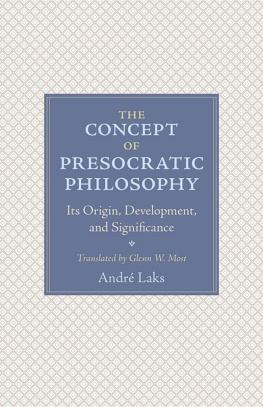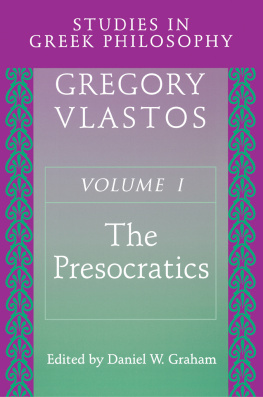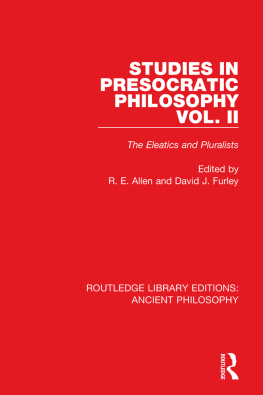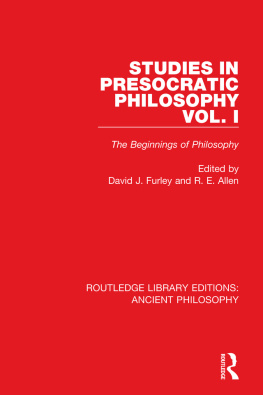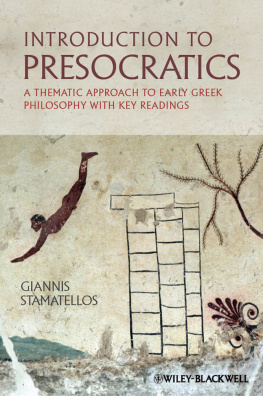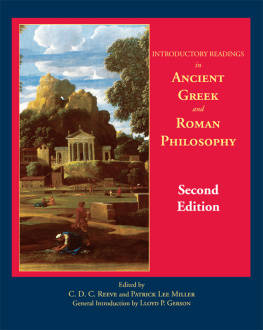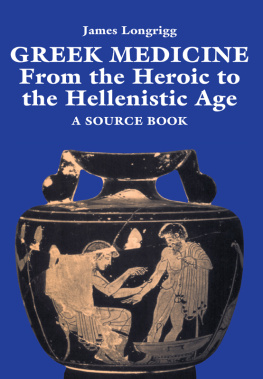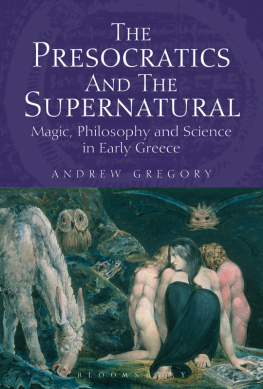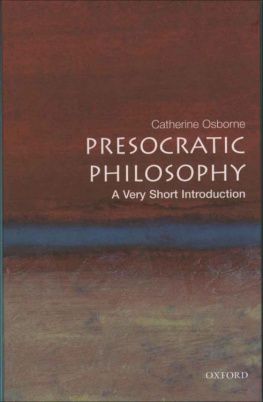The Concept of Presocratic Philosophy

The Concept of Presocratic Philosophy

ITS ORIGIN, DEVELOPMENT, AND SIGNIFICANCE
Andr Laks
Translated by Glenn W. Most
PRINCETON & OXFORD
Princeton University Press
Copyright Presses Universitaires de France, 2006
Title of the original edition: Introduction la philosophie prsocratique
English translation copyright 2018 by Princeton University Press
Requests for permission to reproduce material from this work should be sent to Permissions, Princeton University Press
Published by Princeton University Press, 41 William Street, Princeton, New Jersey 08540
In the United Kingdom: Princeton University Press, 6 Oxford Street, Woodstock, Oxfordshire OX20 1TR
press.princeton.edu
All Rights Reserved
Library of Congress Cataloging-in-Publication Data
Names: Laks, Andr, author.
Title: The concept of presocratic philosophy : its origin, development, and significance / Andr Laks ; translated by Glenn W. Most.
Other titles: Introduction la philosophie prsocratique. English
Description: Princeton : Princeton University Press, 2018. | Includes bibliographical references and index.
Identifiers: LCCN 2017014688 | ISBN 9780691175454 (hardcover : alk. paper)
Subjects: LCSH: Pre-Socratic philosophers.
Classification: LCC B187.5 .L3513 2018 | DDC 182dc23
LC record available at https://lccn.loc.gov/2017014688
British Library Cataloging-in-Publication Data is available
This book has been composed in Adobe Jensen Pro
Printed on acid-free paper.
Printed in the United States of America
10 9 8 7 6 5 4 3 2 1
N. A. T.
CONTENTS
PREFACE
THE ORIGINAL FRENCH VERSION OF THIS BOOK WAS PUBLISHED in 2004 under the title Introduction la philosophie prsocratique. I have modified the text only slightly, essentially doing so only to eliminate certain mistakes or infelicitous phrases and to update the references. As its title indicates, the purpose of this essay is to explain the intellectual circumstances that led to a loose group of early Greek thinkers being considered collectively under the designation of Presocratic philosophers, and, even more concisely, under that of just Presocratics. Those thinkers whom we call the Presocratics did not conceive of themselves as being Presocratics, for a reason even more radical than the one for which the Neoplatonists did not consider themselves to be Neoplatonists: Socrates was not a reference point for them. At most, he was their contemporaryindeed, in some cases, a somewhat younger contemporary. And again it is at most only quite late, at the end of the period that is included under the designation of Presocratic philosophy, that these thinkers began to be called philosophers. But if it is only retroactively that the Presocratic philosophers are philosophers and Presocratics, then it is worth asking how they became Presocratic philosophersin order to cast light upon this construction, to be sure, but also in order to ask to what degree it is legitimate. This latter question explains why I prefer not to use the term invention, which too readily suggests arbitrariness.
The importance of this semantic approach is evidently connected with the fact). Even though my own preference tends clearly toward the latter model, I am not proposing here any approach that could be immune to the criticisms that can be addressed to either one of them, whether regarding their general orientation or particular applications.
References to the fragments of the Presocratic authors are made, whenever possible, both to the edition of reference (Hermann Diels and Walter Kranz, Die Fragmente der Vorsokratiker, 6th edition, Berlin, 195152, indicated as DK) and to the edition recently coedited by Glenn W. Most and myself (Andr Laks and Glenn W. Most, Early Greek Philosophy, Loeb Classical Library, 9 volumes, Cambridge, MA, 2016, indicated as LM). The full references for works and studies, which are cited in the notes by the name of the author followed by the date of the publication used, will be found in the bibliography; the second date that sometimes appears between parentheses refers to the date of the original publication. The translations of the Greek texts cited were either derived from the Loeb edition that Glenn W. Most and I have published (as above) or made by Glenn; he is also responsible for all translations from modern European languages unless these are otherwise attributed.
Glenn first suggested to me that an English translation of this small book would be useful, all the more as it refers more often to the so-called Continental tradition than the Anglo-Saxon one, and he spontaneously offered to translate it. I thank him very much for his initiative. I also wish to thank the readers of Princeton University Press and Ben Tate, the editor responsible for this subject area, who have made this publication possible.
The Concept of Presocratic Philosophy

CHAPTER 1

Presocratics: Ancient Antecedents
THE TERM PRESOCRATIC IS A MODERN CREATION. THE EARLIEST attestation discovered so far is found in a manual of the universal history of philosophy published in 1788 by J.-A. Eberhard (the addressee of a famous letter by Kant): one section is entitled Presocratic Philosophy (vorsokratische Philosophie). to whose creation they contributed but under which they cannot be entirely subsumed. Even if undeniable similarities make the ancient pre-Socratics the natural ancestors of our modern Presocratics, the differences between the two groups are in fact not less significant, in particular with regard to the stakes involved in both of them.
Antiquity knew of two ways to conceive of the dividing line between what preceded Socrates and what followed him: either Socrates abandoned a philosophy of nature for the sake of a philosophy of man (this is the perspective that I shall call Socratic-Ciceronian, which also includes Xenophon), or he passed from a philosophy of things to a philosophy of the concept (this is the Platonic-Aristotelian tradition). Although a bridge was constructed between these two traditions, notably by Plato in the Phaedo (a text that is both complex and decisive for the posterity of the Presocratics), they diverge not only in their tenor but also, and even more, in their effects: while the former only thematizes a certain rupture, the latter by contrast brings to light the thread of a deeper continuity beyond it. This dissymmetry, which can be, and indeed has been, specified in different ways, is essential for understanding the modern fate of the Presocratics. It is worth examining precisely its presuppositions and its consequences.
At its origin, the Socratic-Ciceronian tradition is closely connected with Socratess trial (399 BCE), in which, in order to respond to the accusation of impiety with which (among other things) he was charged, he needed to distinguish himself from an enterprise that had been known at least since the 430s under the name of inquiry into nature (peri phuses historia).
The Phaedo strongly suggests that the phrase inquiry into nature was still perceived as a technical expression at the dramatic date of the conversation it portrays (which is supposed to have occurred on the very day of Socratess death), and we cannot exclude The specification that is called points to the novelty of the expression, if not to that of the enterprise itself.
Next page
